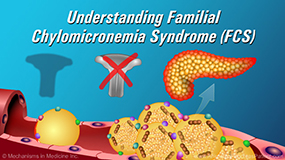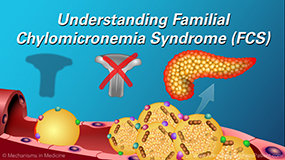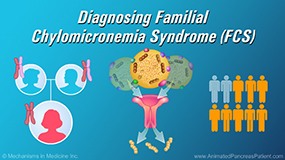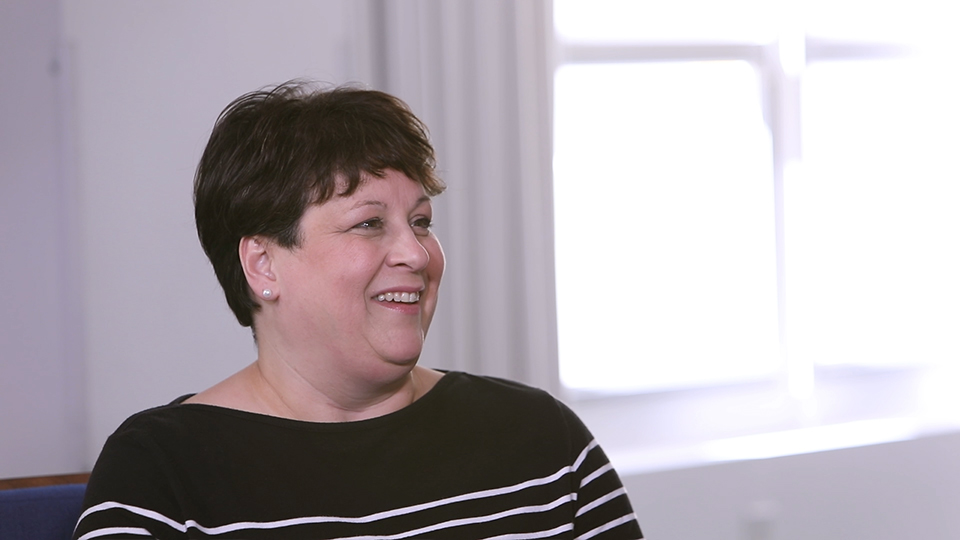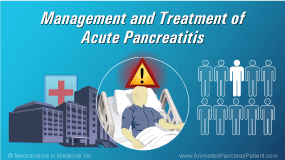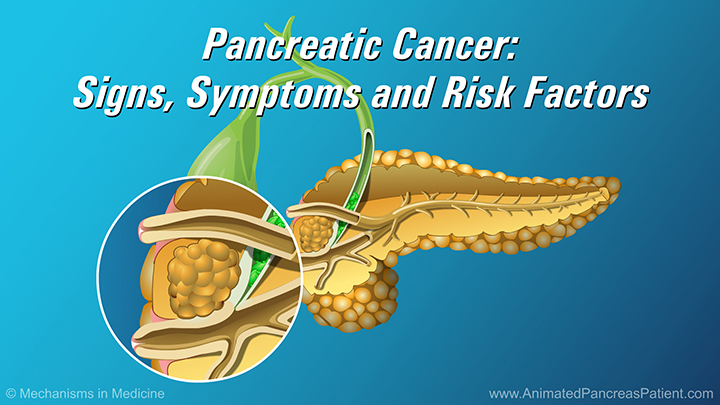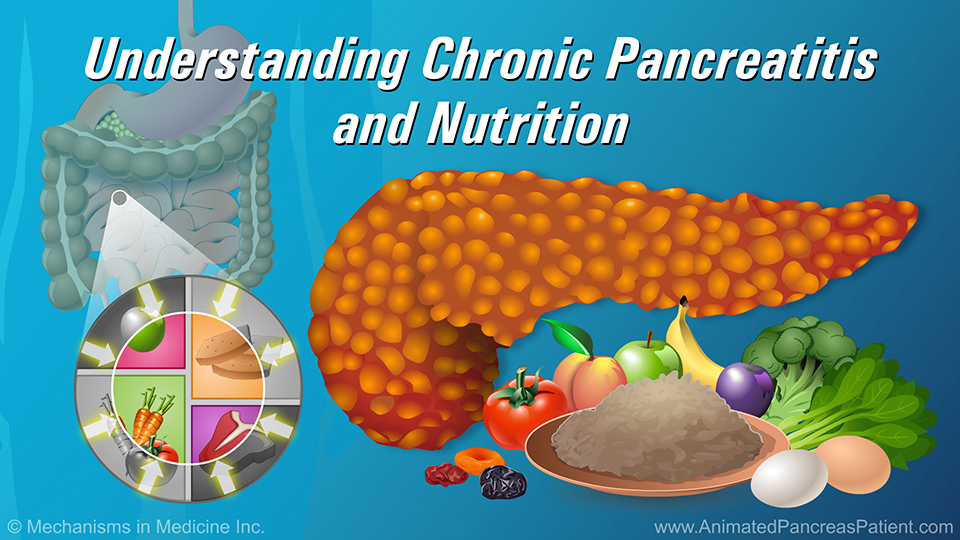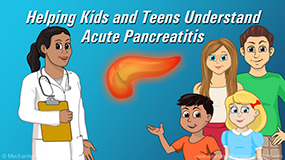Understanding Familial Chylomicronemia Syndrome (FCS)
*Please note: This slide show represents a visual interpretation and is not intended to provide, or substitute as, medical and/or clinical advice.
What is Familial Chylomicronemia Syndrome (FCS)?
Familial Chylomicronemia Syndrome, or FCS, is a disease that prevents the body from breaking down certain types of fats that circulate in the bloodstream.
What is Familial Chylomicronemia Syndrome (FCS)?
Familial means that it can run in families.
Chylomicronemia occurs when fats called chylomicrons build up in the blood. Syndrome means a group of symptoms that are typically seen in a medical condition.
What causes FCS? - 1
The body needs fat to provide energy and help it function. Fat that the body doesn’t need right away is stored. These stored fats are called triglycerides. Chylomicrons are balls of fat that store triglycerides.
FCS leads to a high risk for acute pancreatitis
High levels of triglycerides are a common health problem, but very few people with high triglycerides – around eight in a million (or 1 in 250,000 persons) – have FCS. This small group of people is at high risk for acute pancreatitis, a painful complication of FCS.
What causes FCS? - 2
Before the body can use fats, it has to break them down, using enzymes. Normally, an enzyme called lipoprotein lipase, or LPL, helps the body break chylomicrons apart to release the triglycerides.
What causes FCS? - 3
When you have FCS, the enzyme LPL is missing or doesn’t work properly, and chylomicrons build up to very high levels in the blood. Lipoprotein lipase deficiency is another name for FCS.
What’s the role of the pancreas in FCS?
The pancreas is an organ near the stomach that is frequently affected by very high levels of triglycerides.
What’s the role of the pancreas in FCS?
It has two main functions: it makes hormones, like insulin, which the body needs to break down sugar, and enzymes to digest foods.
What’s the role of the pancreas in FCS?
When LPL is missing or doesn’t work properly, chylomicrons build up in the blood and can sometimes trigger inflammation – pain and swelling – in the pancreas, or pancreatitis.
What are the symptoms of FCS? - 1
Abdominal pain is the most common symptom of FCS, and it can be frequent and severe. Often it’s caused by pancreatitis.
Pancreatitis can severely damage the pancreas. With repeated episodes of pancreatitis, the pancreas may be unable to make enough of the enzymes the body needs to help it digest food. And it may make less insulin, which leads to diabetes.
What are the symptoms of FCS? - 2
FCS can cause other symptoms such as
-
Pea-sized pink bumps on the hands, feet, arms, and legs (called eruptive xanthomas)
- Swelling of the liver and spleen
What are the symptoms of FCS? - 3
People with FCS may also find that they forget things and have trouble thinking or concentrating – sometimes described as “brain fog.”
What are the symptoms of FCS? - 4
People with FCS may get pancreatitis and can feel depressed, anxious, or worried about what they can eat since they need to be on a very low fat diet.
What are the symptoms of FCS? - 4
When you have FCS and you get a blood test, your blood will have a “milky” appearance that’s caused by the excess fat in the blood. An eye exam may show that the blood vessels in the retina at the back of the eye also have a milky appearance.
What risks do women with FCS face if they become pregnant?
Women with FCS who become pregnant face special risks. During normal pregnancy a woman’s triglyceride levels increase. When a woman has FCS, the triglyceride levels get even higher in pregnancy and may be enough to trigger pancreatitis, especially in the 3rd trimester.
What can people with FCS do to manage their condition?
If you have FCS, it’s important to talk with your doctor about your treatment options. The main goal of treatment is to lower triglyceride levels to prevent FCS symptoms and the risk of getting pancreatitis.
What can people with FCS do to manage their condition? Low fat diet
At this time, the only effective treatment is to follow a very low fat diet that includes less than 20 grams of fat per day – that’s about 4½ teaspoons of olive oil. You can achieve this by eating low-fat foods like vegetables, fruit, egg whites, low-fat dairy products, fish, and lean poultry. It is important to work with a dietician.
What can people with FCS do to manage their condition? – Vitamins and supplements
Talk with your doctor about taking vitamin and mineral supplements, avoid eating foods that are high in sugar and fat, and avoid using substances or medications that raise triglyceride levels. A dietitian can help you find a diet that works for you.
What can people with FCS do to manage their condition? - Medium-chain triglyceride (MCT) oil
Also talk with your doctor about using medium-chain triglyceride oil, or MCT, in your eating plan. MCT is a special kind of oil that’s broken down in the liver without lipoprotein lipase, so people with FCS can use it.
Tips for living with FCS - 1
Let’s face it, living with FCS is stressful. You can’t enjoy many of the foods that your family and friends like to eat. You’re always worried about eating something that could trigger abdominal pain or pancreatitis.
But instead of getting stressed out, try to think positively. You can choose to be healthy and to give your body the care it needs.
Tips for living with FCS - 2
If you feel depressed or anxious, talking with a therapist or counselor may help. Also try connecting with other people who have FCS, who understand what it’s like to live with this condition and who can share coping strategies. The National Pancreas Foundation or the FCS Foundation can help, too.
This slide show will help you understand what
Familial Chylomicronemia Syndrome (
FCS) is, including the causes, symptoms, and the high risk for acute pancreatitis. Living with FCS can be very stressful, and this slide show also provides an overview of what people with FCS can do to manage their condition – following a very low-fat diet and as well as other tips. It also briefly describes the risks that women with FCS face if they become pregnant.
-
Share with family and friends:
Click here to take our SURVEY
Your feedback is important to us! We will use your feedback to develop future areas of content about pancreatic diseases which will help other patients, caregivers and families.
Other Sections in this Module:
